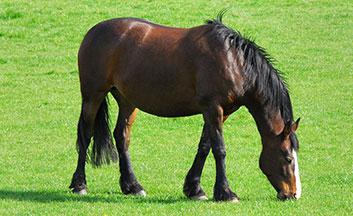Data reveals genetic diversity in horses' immune systems
Insights into the genetic makeup of horses point to a wide variety of newly discovered immune-related genes to identify and fight disease.
Research on a group of genes that play an important role in the immune system of horses has identified a wide range of newly uncovered gene sequences.
The findings, from a study of three European breeds, highlight the diversity in immune system genes across populations of horses that have evolved separately, revealing a greater variety in equine immune genes than previously known.

These results, from analysis of genetic data from 168 horses, could help scientists to better understand equine health, susceptibility to disease, and inform breeding practices.
Genetic discovery
A research team led by the Roslin Institute and the Royal (Dick) School of Veterinary Studies collaborated with colleagues in England, Iceland and Norway to harness a novel approach using an advanced, cost-effective genetic sequencing technology to examine a set of immune genes, known as the Major Histocompatibility Complex (MHC), in three horse breeds - Thoroughbred, Icelandic, and Norwegian Fjord.
These gene sets come in two main types, MHCI and MHCII, each containing a complex arrangement of combinations that can vary significantly between individuals, enabling the immune system to recognise a wide range of potential threats.
Researchers uncovered 152 previously unknown sequences of MHCI genes, which are responsible for monitoring infections within cells, and 117 newly found sequences of MHCII, which help monitor for infections in the surrounding cells.
The discovery of this diverse array of MHC genes could contribute to a better understanding of how genes found in the MHC affect immune responses in horses, and could have wider implications in terms of clinical treatments, the team explains.
This research was published in Genes and funded by the Horserace Betting Levy Board and the Horse Trust.
We found a wide range of MHC genes and patterns of gene expression, allowing us to get a glimpse of how this set of genes may function in horses. These results could prove useful for vaccine development and novel cell-based therapies that are becoming more adopted in equine medicine.
** The Roslin Institute receives strategic investment funding from the Biotechnology and Biological Sciences Research Council and it is part of the University of Edinburgh’s Royal (Dick) School of Veterinary Studies. **


